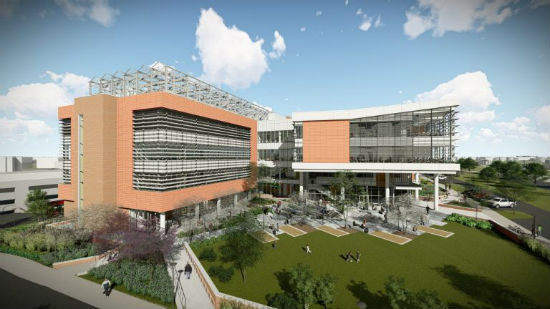
Ag Tech Sector Benefits from NC’s Many Unique Assets

North Carolina enjoys many advantages in agricultural technology, which has propelled its growth into a major ag tech hub.
But hanging on to that dominance requires continued investment and innovation, said panelists at the North Carolina Biotechnology Center’s September AgTech Professional Forum.
Before introducing the forum’s panel members, Scott Johnson, NCBiotech’s vice president of agriculture sector development, outlined the findings of the Center’s North Carolina Ag Tech Economic Growth July 2019 Report.
Johnson noted that in addition to the Center’s comprehensive 26-page January report, this year NCBiotech produced a shorter version that boils it down to the most relevant and popular metrics.
“One of the things that makes us unique,” Johnson said, “is that we have the whole range of companies in AgTech, from Novozymes, Syngenta, and BASF to startups,’” providing unique diversity. He pointed out that while the ag tech sector stretches statewide, 75 percent of the 170 ag tech companies in the state are clustered in the Triangle.
The Triangle is the world leader in plant genetic editing. “No other place in the world has more commercial and academic activity around plant gene editing,” he said. Other North Carolina ag tech clusters, he added, include animal health and nutrition, biologics, and food/feed ingredients.
The Biotech Center, celebrating its 35th anniversary this year, has helped fuel the ag tech sector growth with $3.1 million in ag-related loans leading to $287 in follow-on funding for every loan dollar. It also provided $24.6 million in ag-related grants, leading to $67 in follow-on funding for every grant dollar. Additionally, it has helped recruit 18 ag tech companies to the state since 2016.
Panelists discuss ag tech growth factors
The panel then discussed the factors affecting the ag tech sector’s growth and what is needed to sustain it going forward.
Panelists were: Laura Lee, business recruitment manager, food manufacturing with the Economic Development Partnership of North Carolina; Ryan Combs, executive director, Research Triangle Regional Partnership; Tom White, director, Economic Development Partnership, Office of Extension, Engagement and Economic Development, North Carolina State University; Bill Bullock, NCBiotech’s senior vice president of statewide operations and economic development; and moderator Mitch Peele, senior director of public policy at the North Carolina Farm Bureau Federation.
Lee said the state uses traditional recruiting tools and reaches out directly to companies, but added, “We’re lucky. We have a great name, so companies also come to us.” She added that many states do not have advantages such as the Biotech Center and NC State, one of the state’s two land grant institutions.
Ryan said the Research Triangle Regional Partnership decided to take a new direction in recent years and sell the 10-county Triangle region, anchored by Wake and Durham, to the world. Despite the state’s domestic reputation as a leading biotech and ag tech hub, in Europe, “Many people have no clue where to find us on a map.”
Bullock noted, “We might think others know us better than they do,” but “we have tremendous fundamentals, a formidable life science sector and a tremendous opportunity to increase our outreach.”
The first overseas outreach to Ireland was successful, Ryan said, leading to a partnership with leading Irish University with a $20 million ag tech program and other potential relationships.
Unique NC assets promote growth
The panelists said the state’s impressive and unique assets do help recruit new companies and fuel continuing growth of the sector. Those include the Golden LEAF Biomanufacturing Training and Education Center (BTEC) and the new $150 million Plant Sciences Initiative, both at NC State, the large number of graduates from the state’s public and private colleges and universities, and the Biotech Center itself.
“Having such impressive educational institutions, including the 17-campus University of North Carolina system and a dozen private colleges in the Raleigh area alone, has a huge impact” on recruitment efforts, Lee said. She also said the NC Food Innovation Lab set to open Nov. 14 in Kannapolis will be another distinguishing asset.
“When you can say the state invested $150 million in the Plant Science building at NC State, that’s awesome,” Ryan said. He cited other assets in the state, including the concentration of schools, the talent we have, the $4 billion a year in federal research grants, the state’s agriculture research stations, its two land grant universities, agricultural diversity able to mimic conditions from New England to Florida, and the number-one mid-sized airport in the country.
White pointed out that the state’s numerous rankings and its cities as best places to work and live by magazines such as Forbes and Money are also important.
Lee cited the state’s community college system’s BioNetwork training as yet another top asset.
“The degree of innovation in the state drives the cluster,” added Bullock. “North Carolina is very good at that. When you’re out pitching to people you’re able to talk about these differentiating assets.
Bullock and Ryan both noted that the state needs to continue to invest in the sector to sustain growth.
Bullock concluded with a suggestion: “We need to do more to connect K12 schools with university programs and provide a pathway for people to see where they might work in the life sciences.”
